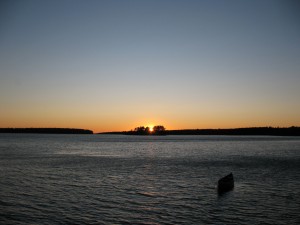On one of the year’s last days, I leave home to walk to the sea. At the driveway’s end I turn right, then soon right again until I reach the end of our cul-de-sac. There, I join a woodland path that threads first through new developments and then into the Town Commons, established in 1719. I am on my way.
Though my proposed walk was a trifle shorter than John Muir’s walk to the sea in 1858, I think the same impulse set each of us walking. Muir famously walked from his Wisconsin home to the Gulf of Mexico, a months-long, thousand-mile venture, the first of his many long walks in a lifetime devoted to first learning and then preserving the natural world (founding The Sierra Club in the early 1900s). But on this first walk, Muir was leaving home to see the ocean, and he was leaving home to find himself. A thousand miles seemed little as obstacle to two such goals.
I too set out to see the ocean, and the icy four miles of trail and road I had to walk seemed short enough. The previous day’s rain had washed away the season’s early snows and all that remained was the foot-beaten track of gray ice, uneven and slick. No one else was afoot in the woods; the sweep of north wind rushed in the high pines.
Like Muir I had walked away from home to be alone. Muir was leaving more than I and for longer, however. Behind him as the miles multiplied faded the defining force of Muir’s Scottish father, a dour, strict man who established order with day-long, pioneer labor and evening and Sunday worship of Calvin’s God. Muir and his siblings lived lives of tedium, exhaustion and fear as they hacked a life from the Wisconsin woods.
My happy home amid a fringe of white pines in Brunswick, Maine contains none of what oppressed Muir, but it does hold the predictable me; the paradox holds that you must leave home to find yourself (a truth certainly apparent to all of the students I teach as they look outward at college and its surrounding world). Re-enacting this departure daily has always seemed to me a necessity. Otherwise I become too sure of myself, too certain that what I see and feel has the inevitability of fated truth.
The trees in the Town Common stand and wave between forty and seventy feet in height, and it was their collective voice I listened to as I walked south. Trees, of course, walk nowhere (unless you count Tolkien’s ents); they are masters of staying put, sending down fingery roots that, over time, sometimes exceed the tree’s airy reach. Few of us linger with trees, especially as we pass beyond the age of imagination, when climbing them seems a discovery of both distant worlds and a trusted relative. On this day, however, even with the sea calling, I stopped with a few and ran my hands over the rough corrugation of their trunks. Looking shyly both ways first, I half encircled one big fella with my arms, pressing my cheek to its bark’s roughness. Its tonnage rose above me; its girth exceeded my longest reach; I felt satisfyingly small. Then I walked on and emerged from The Town Common onto a series of backroads that lead to the sea.
Why did Muir choose the sea? I can’t recall whether, in his essay, he said so or not. But in mid-walk among the fields that open down to Middle Bay, I sense what Muir may have felt: expansive freedom and a return of sorts to some lost, original place. I go to the sea daily when I’m in Maine, and it never loses its strangeness. Well, let’s see: here we have familiarity and strangeness, an odd, perhaps self-canceling combination, yes?
Thoreau – forewalker to Muir – knew such mixtures – he called it being awake.

